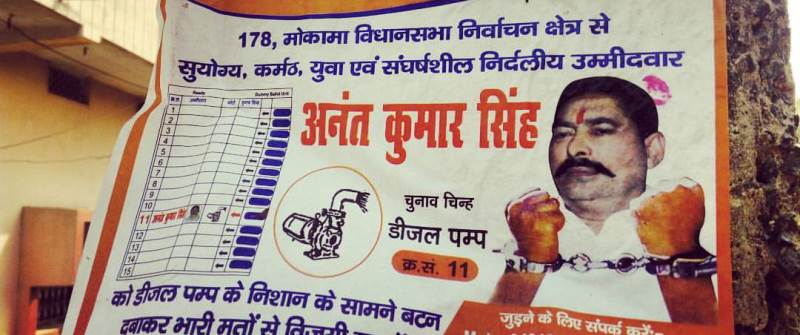
14 Mar Blog: ‘When crime pays’: Evaluating money and muscle politics in India
By Sarthak Bagchi
Why do criminals enter politics in the world’s largest democracy? Why do parties nominate candidates with criminal backgrounds? And why do voters support these candidates? Sarthak Bagchi delves into some of the most pertinent questions shaping the debates on the quality of democracy in India.
In his new book, the political scientist Milan Vaishnav provides some definite answers to these questions. Let’s begin by looking into some statistics on the entrenchment of crime and politics in India.
In India’s 2014 general elections, 21% of the Members of Parliament had serious criminal charges against them, ranging from kidnapping to abduction, threatening, intimidation, and even murder. In 2004, this figure was around 12%. The phenomenon is seemingly more prevalent in the northern parts of India but it is widespread in other regions too. In the Assembly Elections in Uttar Pradesh, a largely rural state, which are going on at the moment, 13% of over 3000 candidates have serious criminal charges against them. In the recently concluded Municipal Elections in Mumbai, one of India’s largest metropolitan areas, 19% of the elected 227 corporators (councilors) have a criminal background.
So why are politicians with criminal backgrounds participating in – and winning – elections? Vaishnav attributes this to two important developments in Indian politics. The first is the increasing importance of money in elections. As the author points out, “Political parties prefer self-financing candidates who do not represent a drain on the finite party coffers but instead contribute ‘rents’ to the party”. Despite their criminal record, their vast resources make them electorally competitive.
The second development is the widespread perception of politicians with criminal backgrounds as people who can ‘get things done’. In India’s ‘patronage democracy’, these representatives are expected to facilitate informal mediation to access state resources on behalf of their voters. Politicians who have criminal backgrounds are perceived to be more effective in harnessing these resources. Vaishnav found that they have an 18% chance of winning their next election, in contrast to 6% for ‘clean’ candidates.
While a proven criminal background certainly gives an edge to politicians, they also have to resort to emotional and personal appeals. I witnessed two such instances over the course of my fieldwork in Bihar, a state known for its rampant crime and the cozy relationship between politicians and criminals. In the capital city of Patna, the erstwhile dreaded criminal-politician Pappu Yadav humbly courted two young boys: “Aadesh kariye, kya sewa karu?” (Please instruct, how may I serve you?). The boys were from his constituency of Madhepura, which Yadav represents in Parliament. Having come to offer their services for his election campaign, they were surprised at the warmth and affection of this strongman and ended up taking a selfie with him.
In another instance, from Mokama, the ruling MLA, Anant Singh, also known as chote sarkar (young lord), successfully won the assembly election from the confines of prison. Incidentally, he had his wife mobilize votes for him by circulating a picture of him in handcuffs around the constituency for a dramatic personal appeal to voters.
Such instances illustrate how politicians with criminal backgrounds find legitimacy in electoral politics. Their strategies deserve to be analyzed thoroughly to understand the quality and functioning of democracy in India, particularly in view of the increasingly important role that campaign finances play in electoral politics.
(Sarthak Bagchi‘s research interests are in the everyday functioning of democracy in India. He is particularly interested in how maneuvering takes place in various state-society relations in everyday forms of politics. Also a keen follower and observer of elections, he wants to see these changing and metamorphosing forms of state-society interactions through the lens of elections, in the democratic set-up. Recent experiences have busted some of the myths in the way the state or agents of state try to maneuver with the society at large and people in particular. Therefore he believes a systematic study of both these agents and the society might help in a better understanding of the processes.)




No Comments